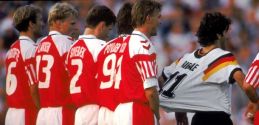 77 comments
77 comments
The fortnightly change in 10 chaotic Championship months
With only 14 points separating the play-off places from the relegation zone, the Championship was once again a closely contested mad scramble for the top flight.
And with reason, as the rewards for promotion are vast. Swathes of money from television rights and additional sponsorship propel clubs towards financial stability and the bright lights of the Premier League.
However, the many Dick Dastardlys in charge of Championship clubs will stop at nothing in their pursuit of a winning finish, and with over 20 changes in management in England’s second tier this season - following Dean Saunders’ dismissal at Wolves on Tuesday - the pressure on managers to throw their team towards the top was immense. And the much maligned Steve Kean got things under way on September 28 when he was “forced to resign” to begin a season of farce at Blackburn.
He was replaced by Henning Berg three days later, but he became the club’s shortest serving manager after lasting only 57 days, but his successor Michael Appleton faired a bit better and managed 67 days in the job before being pushed, leaving Eric Black to take charge as caretaker manager and Gary Bowyer fronted an empty queue to take charge for the remaining games. Odds on the next manager’s tenure being a lengthy one are short at Luxbet and TAB.
Owen Coyle was next out the door at Bolton on October 9 after securing just three wins in 10, before Jimmy Phillips filled in and Dougie Freedman took permanent charge on October 25.
Three days later Eddie Howe left Burnley in favour of a return to newly promoted Bournemouth for personal reasons and was replaced by Sean Dyche, while Paul Jewell was given the boot on October 24 after one win in 12 left Ipswich rooted to the foot of the table, leaving Mick McCarthy to pick up the pieces.
Freedman’s move triggered a succession of changes when he swapped Crystal Palace for Bolton on October 23, beginning with Ian Holloway’s move from Blackpool to Palace, after Lennie Lawrence and Curtis Fleming held the fort in the interim.
The vacant spot at Bloomfield Road was filled by Portsmouth’s Michael Appleton, but he left for the poison position at Blackburn on January 11 and Paul Ince was appointed on February 18, after assistant manager Steve Thompson had filled in.
Bristol City removed Derek McInnes in favour of Sean O’Driscoll in January, after the 55-year-old was given the boot by Forest on Boxing Day, after five months in the job, paving the way for the return of Billy Davies on February 7, after Alex McLeish completed a 40 day managerial tenure at The City Ground in the interim, before parting company with the club.
Mark Lillis covered for Simon Grayson when Huddersfield sacked him on January 24 and Mark Robins took charge on February 14, while Neil Warnock began looking for his 14th managerial post after Leeds ended his 13 month reign on April Fools’ Day and former Reading boss Brian McDermott took over 11 days later.
And Kenny Jackett grabbed his Millwall coat at the season’s end after six years at the Den, but at Molineux, Wolves added to the misery of successive relegations by adding severance pay for two managers to their dwindling finances.
Stale Solbakken was given the boot after January’s FA Cup defeat to non-league Luton, and Dean Saunders followed him through the exit door on May 7 after his 20 game tenure ended in relegation, to prove the prize for failure to find promotion for managers can be just as great as reaching the top.
Tags: Championship, Premier LeagueShare this article
Commenting is closed for this article.
- When did co-commentary become such a serious and miserable business?
- Why do we devote so much time to sharing our love of football for free?
- Villa’s Tokyo downfall: The apparent formality of a world title match
- Son Heung-min and the forgotten wonder goals
- Guess the Premier League goalscorer from the GIF
- A fateful flight
- Goodbye to the instant analogue gratification of Ceefax
- Player Profile: Steve Ogrizovic
- Rejecting FA Cup money in favour of a car boot sale
- It’s a man’s world? Former Arsenal manager crosses the gender divide











